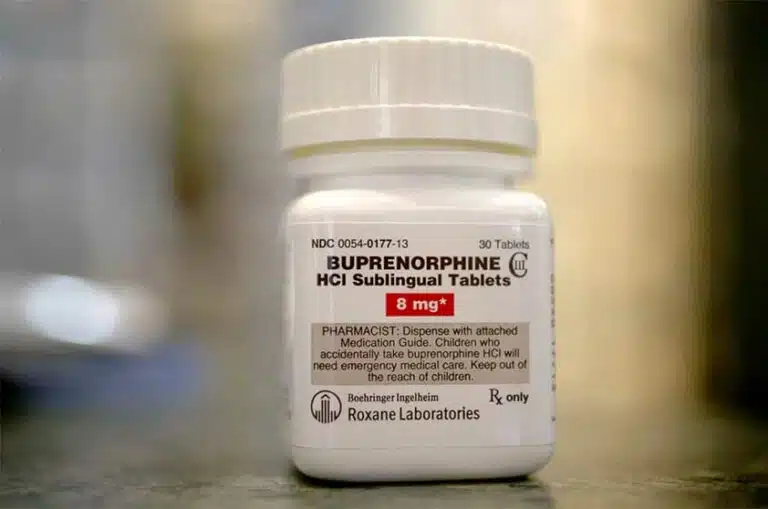The Challenges Of Buprenorphine Treatment In The Age Of Fentanyl
- Buprenorphine & Opioid Addiction
- How Fentanyl Affects Buprenorphine Treatment
- How Doctors Are Responding To Challenges
- Buprenorphine Treatment In The Future

The opioid epidemic has caused a record-breaking surge in overdose deaths, largely due to fentanyl. Fentanyl is a synthetic (human-made) opioid that’s up to 50 times stronger than heroin.
Along with accelerating overdose deaths, the drug has also made it harder for doctors to treat opioid addiction. Opioid addiction is a serious disease that makes you feel unable to stop using opioids. People with this disease face a high risk of deadly overdose.
One of the most effective opioid treatments is a medication called buprenorphine. However, in the age of fentanyl, buprenorphine treatment can be challenging.
Buprenorphine & Opioid Addiction
Buprenorphine is a partial opioid agonist. That means it activates the same receptors in your brain that get activated by opioids. However, it activates these receptors to a much smaller extent than other opioids.
As a result, if you have opioid addiction, buprenorphine will not make you feel high. Instead, it will just reduce your opioid cravings and withdrawal symptoms. This effect can make your recovery from opioid addiction much easier.
How Fentanyl Affects Buprenorphine Treatment
If you take buprenorphine when you still have opioids in your system, you may experience severe withdrawal symptoms such as anxiety, nausea, and stomach pain.
That’s why most doctors won’t administer buprenorphine until you have gone at least 12 to 24 hours without using opioids.
While this strategy works with most opioids, it doesn’t always work with fentanyl.
Withdrawal Symptoms & Risk Of Relapse
Even if you stop using fentanyl for a full day or more, you may still experience withdrawal symptoms upon taking buprenorphine. This is probably because fentanyl is so much stronger than other opioids. It also stays in your body for a longer period of time.
This issue has serious consequences for patients with fentanyl addiction. To stop the withdrawal symptoms, they may start using fentanyl again, significantly raising their risk of overdose.
Refusal To Restart Buprenorphine Treatment
Patients may also refuse to restart buprenorphine treatment because they don’t want more withdrawal symptoms.
Avoiding buprenorphine can severely hinder a person’s recovery. That’s because the only other drug approved to treat opioid addiction is methadone.
Methadone is much more regulated and harder to access than buprenorphine. In most cases, you can only get it by visiting a specialized clinic each time you need a dose (usually once a day).
How Doctors Are Responding To The Challenges
When doctors first started using buprenorphine to treat opioid addiction, they rarely faced the issues described above. That’s because fentanyl was much less popular at the time.
In recent years, however, fentanyl has slowly taken over the drug supply.
Drug dealers secretly add it to various substances, including powder drugs (like heroin, meth, and cocaine) and fake prescription pills (like OxyContin and Xanax). That means anyone who uses street drugs could become addicted to fentanyl, even if they don’t realize they’re using it.
Because the issue is so new, there has been very little research on the way fentanyl hinders buprenorphine treatment and how to manage it. As a result, doctors have been forced to come up with their own solutions.
Microdosing Buprenorphine
Some doctors try to fight fentanyl withdrawal symptoms by “microdosing” buprenorphine.
That means they start patients on a very small dose of the drug and gradually increase it. This strategy could prevent patients from receiving too much buprenorphine at once, which may reduce the risk of withdrawal symptoms.
Large Doses Of Buprenorphine
Other doctors use a completely different method. They administer giant doses of buprenorphine, sometimes up to 32 milligrams (four times a standard first dose). These doses are meant to stop fentanyl withdrawal symptoms before they start.
Naloxone
Although it’s controversial, some doctors prepare patients for buprenorphine by administering naloxone.
Naloxone is a medication that treats opioid overdoses. When a doctor gives it to a patient who is not overdosing, it may cause a short burst of withdrawal symptoms. The doctor then administers buprenorphine to treat these symptoms, in hopes the patient will view the drug as helpful instead of harmful.
Additional Medications
When using any of these three approaches, many doctors also prescribe other medications to ease certain withdrawal symptoms. Depending on the patient’s needs, these medications may include ibuprofen, antihistamines, and anti-nausea medications.
The Future Of Buprenorphine Treatment
The rise of fentanyl has presented unique challenges for buprenorphine treatment.
Despite these challenges, buprenorphine can still be an effective treatment for fentanyl addiction, especially if the doctor uses one of the above approaches. In the meantime, doctors and addiction advocates are urging researchers to investigate fentanyl’s effect on buprenorphine and possible solutions.
If you or someone you love struggles with opioid addiction, please reach out to an Ark Behavioral Health specialist. Our inpatient and outpatient treatment programs offer personalized, evidence-based care to help you or your loved one stay drug-free.
Written by Ark Behavioral Health Editorial Team
©2024 Ark National Holdings, LLC. | All Rights Reserved.
This page does not provide medical advice.
Centers for Disease Control and Prevention - Fentanyl Facts
National Library of Medicine: MedlinePlus - Buprenorphine Sublingual and Buccal (opioid dependence)
National Library of Medicine: MedlinePlus - Opiate and opioid withdrawal
STAT News - Fentanyl isn’t just causing overdoses. It’s making it harder to start addiction treatment
Substance Abuse and Mental Health Services Administration - Buprenorphine

Questions About Treatment?
Ark Behavioral Health offers 100% confidential substance abuse assessment and treatment placement tailored to your individual needs. Achieve long-term recovery.
100% confidential. We respect your privacy.
Prefer Texting?
Our friendly support team is here to chat 24/7. Opt out any time.







 Learn More
Learn More








